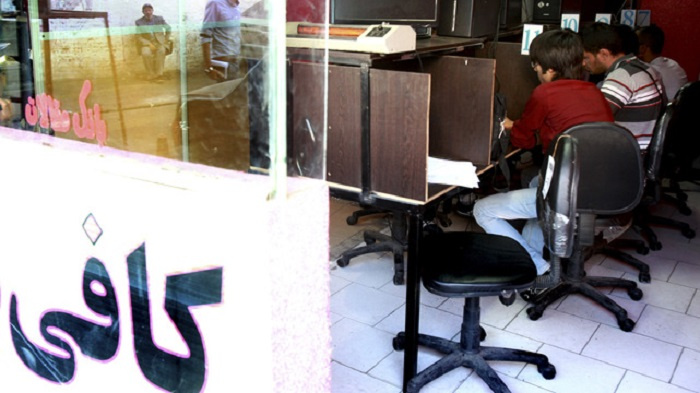"Immoral" Use of Internet Stirs Concern in Iran

(A CoffeeNet, internet cafe, in downtown Tehran. Source: Ebrahim Norouzi/AP)
In a conference on “Social media, University and Cultural Policies” held last week, Mohammad Mahdi Fatourehchi, the dean of Tehran University’s Institute of Social Studies and Research, told the attendees that more than a million Iranian internet users have visited “immoral” websites in recent years. By the word immoral, he meant porn.
While Fatourehchi failed to provide any details or sources, the mere disclosure was enough to prompt emergence of a debate, with several news outlets on the frontline.
As the name of the conference suggests, some Iranian experts put the blame on the prevalence of social media. Mohammad Aghassi, director of Iranian Students Polling Agency (ISPA), an authoritative source, offers stats: “According to a recent poll, 53 percent of Iranian citizens are users of social networks. Telegram is the most popular with almost 28 million users,” the website Entekhab quoted him as saying during the conference.
When Entekhab seeks commentary from psychologist Behrouz Birashk, Telegram is the main subject again. Birashk believes that blocking cannot stop the entire flow of pornographic material. Then the blame sits on the adolescents. “A few years ago, statistics based on Google search showed that most of the searches conducted by Iranians were associated with sexual keywords. The age or gender of the users was not specified but one could guess that they are mostly male teenagers that are after these things,” he told Entekhab. “They feel restricted to have contact with the opposite sex and cannot bring up the problem as such issues are still considered taboos in many [Iranian] families,” he added. The remedy he puts forward is a combination of blocking and sexual education.
Every now and then often-exaggerated figures of the viewership of pornography in Iran hit headlines. Fararu has used Google Trends, a tool that shows the frequency of search-terms entered as based on language and/or region, to verify the incredible numbers.
According to Fararu, the Persian equivalent of the term ‘sex’ (سکس) puts Iran on the third place. More than 100 million people speak Persian in Iran, Afghanistan, and Tajikistan but Iran has a population of over 75 million people. However, a second Google-Trend table published by Fararu shows that the English word SEX sets Iran below the first twenty countries.
This however does not amount to the whole number of people who watch pornography in Iran. Many still buy pornographic films on CDs and DVDs or use files transmitted person to person. These have made it impossible for Iran to come to conclusive statistics.
As counseling psychologist, Mahdi Malek-Mohammad tells Fararu, field and clinical observations indicate that porn viewership figures are appalling in Iran. However, Iran has for years experienced the lack of integrity in statistics, as reflected in the Supreme Leader’s mid-September remarks, in which he called on officials to identify the cause of the problem.
“Statistics on social issues are less helpful than other statistics,” Malek-Mohammad said. Furthermore, he notes that in spite of heavy Internet blocking, circumventing censorship is quite simple for most Iranians.
Speaking of the reasons behind the popularity of porn, Malek-Mohammad argued that Iran is among the few countries where sexual relations have minimum demonstrations in the public domain and maximum demonstrations in private circles. “The more its proper demonstration is blocked, the higher the possibility that its improper demonstrations emerge,” he tells Fararu.
“The age of marriage has increased while people reach puberty at the age of 15 and need sexual relations. How are they supposed to fulfil their needs?” says the member of Iranian Psychological Association.
Malek-Mohammad says the remedies put forward so far, including temporary marriage (recommended in Shia faith) or lowering the age of marriage to that of high-school students, will only make the situation worse.
“Individuals are made to think that they should suppress their [sexual] needs until marriage; any contact between boys and girls are banned and the TV pictures a totally different society,” Malek-Mohammad added. “Self-restraint has a limit. From a point on, you will decide to fulfil your needs.”

